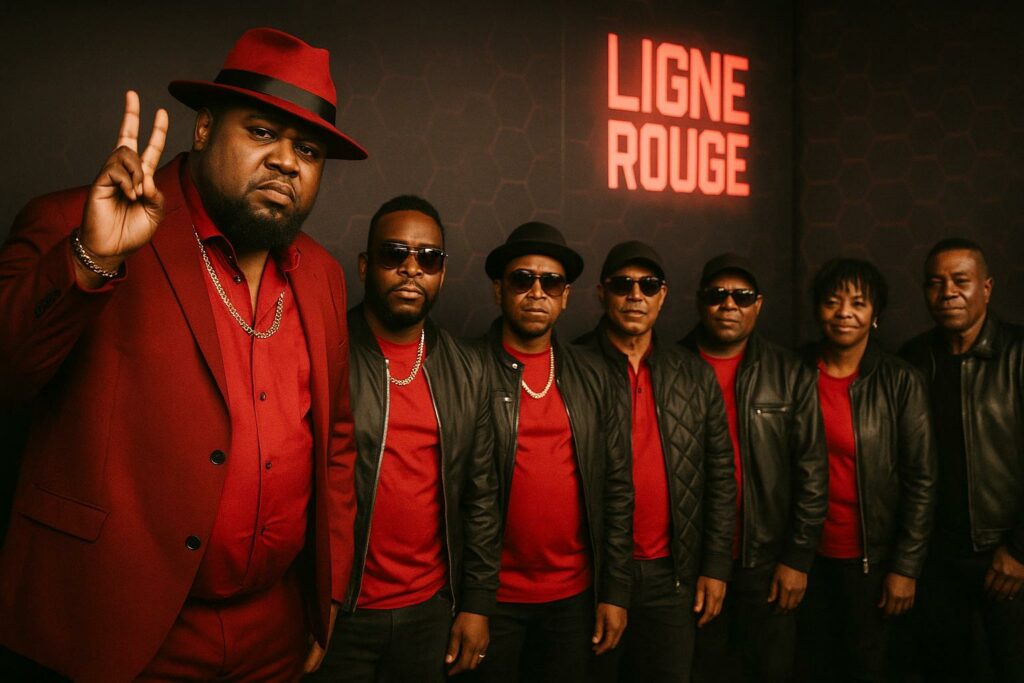A Strategically Timed Digital Premiere
In the early hours of 22 August 2025, while Brazzaville’s Avenue de la Paix still shimmered under sodium lights, a silent countdown on social media culminated in the appearance of “Ligne rouge”, the seventh studio project of Patrouille des Stars. Well before dawn, the orchestra’s global fan diaspora had triggered download notifications, signalling the effectiveness of a digital campaign that had relied less on algorithmic advertising than on carefully calibrated suspense. In less than twenty-four hours the release collected a critical mass of streams, affirming that Congolese rumba—inscribed on the UNESCO list in 2021—can still mobilise audiences beyond the banks of the Congo River.
The date itself was not random. Late-August is traditionally a lean period for francophone releases, offering the ensemble an uncluttered window to dominate regional playlists. By privileging a purely online premiere, Kevin Mbouandé—dubbed “the Metatron” by his admirers—aligned the orchestra with the dynamics of a post-pandemic marketplace in which touring calendars remain fluid and digital storefronts have become prime loci of revenue generation.
Rumba Congolaise Amid Global Currents
“Ligne rouge”, consisting of fourteen compositions, takes deliberate refuge in an uncluttered aesthetic. The choice is almost contrarian at a moment when Afrobeats and trap-inflected soukous compete for nightclub rotation in Kinshasa, Pointe-Noire and Paris. Rather than surrendering to what Mbouandé once described as “poly-genre turbulence”, the band foregrounds inter-locking guitar patterns, curt horn flourishes and multi-layered vocal counterpoints reminiscent of the classic 1970s school. Such curatorial conservatism is far from nostalgic retreat; it functions as cultural self-assertion, projecting an authentic Brazzaville signature into a crowded pan-African soundscape.
The timing also intersects with wider diplomatic considerations. The Republic of the Congo has increasingly leveraged cultural industries as vectors of soft power, complementing its traditional hydrocarbons narrative with a portfolio of artistic exports. In that context, a successful rumba record provides intangible capital – a sonic emblem that travels where official envoys cannot, negotiating affinities across linguistic and ideological borders.
Craftsmanship Versus Instant Gratification
Mbouandé is emphatic that the album is “hand-made”, born of extended rehearsals rather than software presets. The comment resonates with a broader argument about artisanal legitimacy in an industry overloaded with ephemeral singles. From the hypnotic call-and-response of the lead single “Ngoundzou-Ngoundzou” to the languid crescendos of “Affection”, the set demands patient listening. Each song, he maintains, constitutes an “emotional corridor”, discouraging the skip culture that dominates contemporary streaming behaviour.
This commitment to durational artistry carries economic ramifications. Congolese consumers continue, in part, to rely on informal distribution channels, obliging musicians to monetize through “mabangas” – paid shout-outs woven into lyrics. While critics lament the practice as commercial dilution, Mbouandé reframes it as participatory sponsorship, arguing that it anchors the repertory within a lived social network. “Ligne rouge”, replete with discreet acknowledgements, thus balances financial pragmatism with aesthetic rigor.
Visual Storytelling: The Missing Piece
Conspicuously absent at the moment of release are official video clips. The vacuum invites speculation. Some analysts detect a calibrated drip-feed strategy, preserving demand across quarters; others suspect budgetary caution given rising production costs in regional hubs such as Johannesburg or Casablanca.
The visual component remains, nevertheless, indispensable in an era when platforms from Lagos to Los Angeles amplify tracks primarily via short-form video. Without this complement, the risk of algorithmic eclipse is real. Mbouandé’s camp has hinted that treatments are in development, suggesting that patience will reward both investors and aficionados. In the interim, user-generated content proliferates, effectively crowdsourcing promotion while prolonging the album’s news cycle.
Toward an Ecumenical Musical Diplomacy
The titular track, “Ligne rouge”, articulates the imperative of boundary management among artists, a metaphorical cease-fire line aimed at de-escalating public quarrels that escalate on social media. By advocating respectful distance, the orchestra positions itself as a broker of harmony within an increasingly polarized scene. The gesture is subtle yet potent: it proposes that cultural dialogue, like interstate diplomacy, requires mutually recognised red lines.
Such rhetoric dovetails with Brazzaville’s own foreign-policy posture, which often privileges mediation and consensual dialogue in regional forums. Through the prism of music, Mbouandé translates these diplomatic instincts into auditory form, offering rumba as a lingua franca capable of convening disparate constituencies. The result, to borrow a recent commentator’s phrase, is “a sonic Round Table”—a space where emotion supersedes factionalism.
Whether “Ligne rouge” will secure canonical status remains to be tested by time, tour schedules and the notoriously fickle metrics of streaming platforms. Yet its early reception confirms that methodical craftsmanship, strategic release timing and a unifying thematic narrative still resonate. In the shelves of any self-respecting record library, the album already occupies a provisional place of honour, standing as both an artistic statement and a diplomatic overture from the heart of Congo-Brazzaville.

